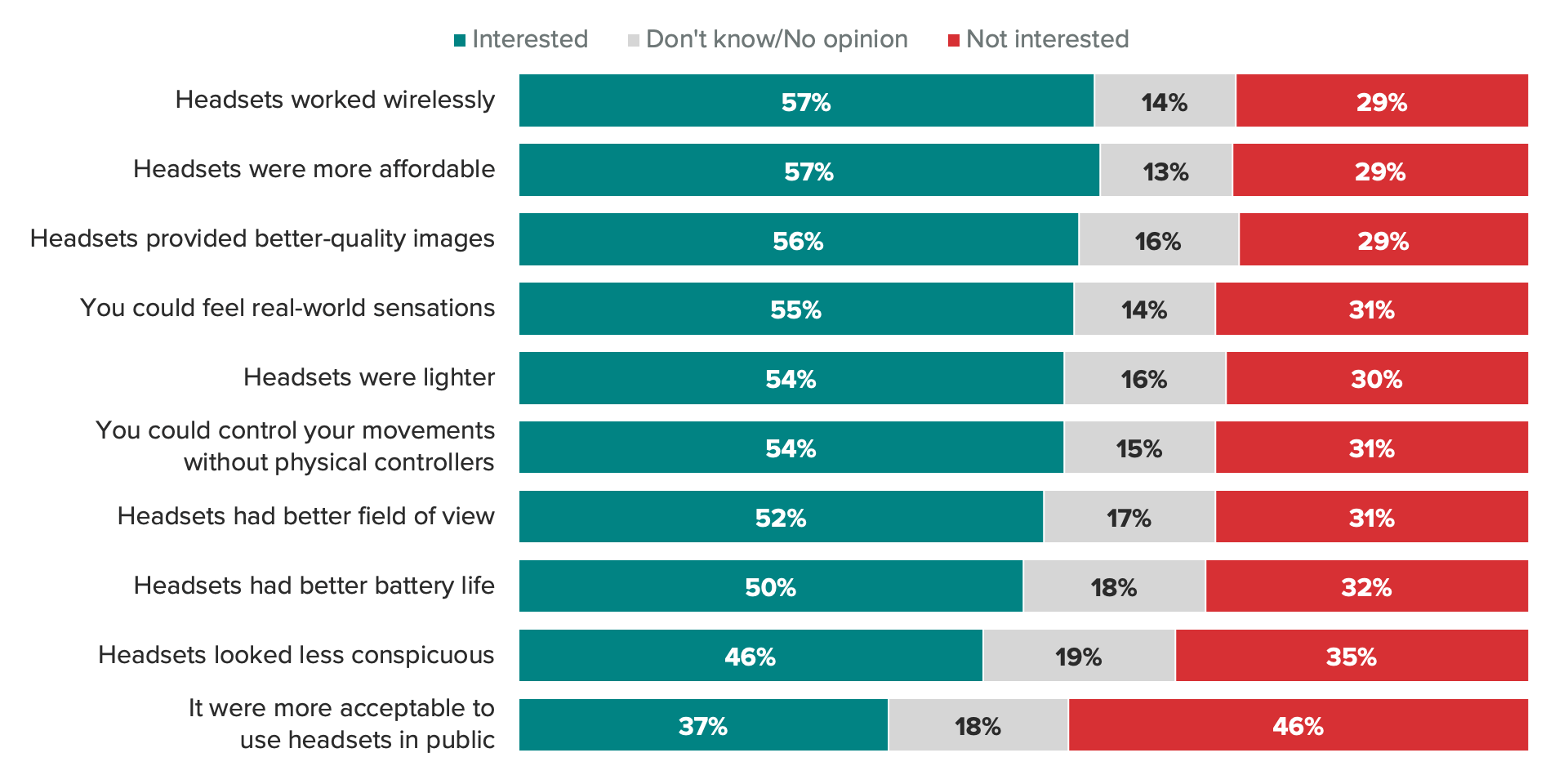RoadHazard
Gold Member
"at a mainstream level" it's in your own quote lol
The Quest 2 is the most mainstream VR headset on the planet.
"at a mainstream level" it's in your own quote lol
The Quest 2 is the most mainstream VR headset on the planet.
I'm surprised no other manufacturer (other than eye-tracking) has though about motion based VR yet for headsets at a mainstream level.
What does the Quest 2 have to do with "you are the controller" style motion controls or precision tracking rings etc.
You're confusing a device having something with what it's known for. People don't think of Quest 2 and think it of it's grand motion controls lol.
The quote is clear
Notice I said other than eye-tracking, because everyone and their dog is trying to add some form of eye tacking in upcoming VR headsets, and the feature is being heavily promoted as a big deal, mainstream knowledge even among the casuals disinterested.
This is not true for motion controls with VR, controller-free.
The Quest 2 is mainstream


Normies will buy it because it will be marketed well.Another Stadia
This is plain wrong, hand tracked input in VR is already a thing without the issues you mention.the time it takes to read the gesture, decipher it and give you an input command, takes too long.
Another Stadia

Good for you!No it won't. It won't be turning me into anything, I'm not ever using that shit.
For AR, absolutely, using hands is the most natural thing, for VR gaming, definitely not, for majority of games controllers (including wheels and flight sticks) will be required. So depends on use as to which is required.The morning consult data makes the reaction in this thread hilarious in hindsight,

Looks like many consumers don't want controllers at all.
For AR, absolutely, using hands is the most natural thing, for VR gaming, definitely not, for majority of games controllers (including wheels and flight sticks) will be required. So depends on use as to which is required.

That's until you try it yourself concretely and realize that motion control is far too slow andhttps://www.laptopmag.com/news/apple-vr-headset-may-turn-you-into-the-controller-heres-how
Kinect was the solution for VR being mainstream the whole time.
But seriously, I'm surprised no other manufacturer (other than eye-tracking) has though about motion based VR yet for headsets at a mainstream level. The novelty of touchless VR as if you were in a sci-fi movie, even if it doesn't work very well, is a selling point on it's own.
Being able to reach out and open an app, or slide around screens or data around is basically something out of Fifth Element, Minority or Demolition Man.
Of course we'll have to wait and see if that ends up being cool in execution.
That's until you try it yourself concretely and realize that motion control is far too slow and
Take a simple FPS game,
That's until you try it yourself concretely and realize that motion control is far too slow and
Take a simple FPS game, for example. You just command it with your body (maybe mimicking a gun with your hand and fingers): now, if you have to simply fire your gun, what you do? Do you "click" your finger like you would press a trigger? Ad if so, how wide has to be the finger movement to be registered as a fire input? If it's too wide, it's tiresome and slow. If it's short, you will continuously trigger fire just casually moving your fingers. That's just an example out of may others, and it can be solved in different ways, but it adds a nrw problem that has to be solved. And anyway, no movement would be able to be so quick like the pressing of a button, not without creating many errors. Also, all the haptics and satisfacting recoils from them would be lost, loosing one of the layers of sensations that make the experience more enjoyable and help to keep it more grounded.
It would be good for some things (especially with a wireless headset), but too limiting for others. I would never want it, at least until some brain user interface will be able to command from our will and let us experience sensations directly driven by the game outputs.
Quest 2 has had this for a while now.
It even has games with hand tracking, vape pen, and smoke cloud tracking.

Take DCS for example, nobody expects to fly the plane without HOTAS. But if removing your hands from HOTAS would detect your hands for all the switches in the cockpit, it would be a godsend.
Even little details like this helps immersion!
There's no such thing as too many features in VR
Having to find a keyboard/mouse/switch while you have a VR headset to toggle switches is painful.
... and inaccurate (not as tracking, but as readability thereshold).Was there supposed to be text after "and"?
You're reasoning is logical, but the reason why I think many consumers don't want controllers is because they want 90s sci-fi movie VR, they don't want just a general immersive helmet.
As the chart indicates, they want wireless, low weight, high-end image and video, in a less conspicuous form, with motion controls.
The general audience may even consider wearing gloves or Apple is working on rings to put around your finger for precision for this to work. They aren't thinking about what you brought up because in their minds, by having a controller trigger do that, then what's the point over VR over a regular controller?
That's their mindset, so they want the touch and motion movement because that's how they see VR tech, they see that as the future and have been looking at VR that way since the old sci-fi movies. Even if it's not practical.
Eh it will be a bit different if an entire UI system uses hand gestures etc.

